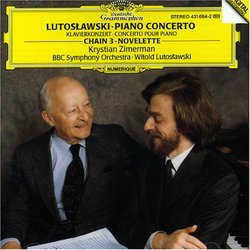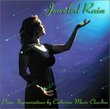| All Artists: Witold Lutoslawski, Krystian Zimerman, BBC Symphony Orchestra Title: Witold Lutoslawski: Concerto for Piano and Orchestra / Chain 3 / Novelette - Krystian Zimerman / BBC Symphony Orchestra / Witold Lutoslawski Members Wishing: 1 Total Copies: 0 Label: Dg Imports Release Date: 3/21/2005 Album Type: Import Genre: Classical Styles: Forms & Genres, Concertos, Historical Periods, Modern, 20th, & 21st Century, Instruments, Keyboard Number of Discs: 1 SwapaCD Credits: 1 UPC: 028943166423 |
Search - Witold Lutoslawski, Krystian Zimerman, BBC Symphony Orchestra :: Witold Lutoslawski: Concerto for Piano and Orchestra / Chain 3 / Novelette - Krystian Zimerman / BBC Symphony Orchestra / Witold Lutoslawski
CD DetailsSimilar CDs
|
CD ReviewsContemporary piano concerto for lovers of "old" music Crt Sojar Voglar | Ljubljana, Slovenia | 04/29/2005 (4 out of 5 stars) "Witold Lutoslawski's single Piano concerto (although composer wanted to write one at the young age but was not satisfied with progress) is one of the most "listenable" contemporary concertos of the man, who went through the avant-garde period to establish a new language with beauty. There are typical "Lutoslawski" elements in the concerto: avoiding tonal duplications between melody and harmony, harmony progression with thirds, fifhts and sevenths, colourful orchestration (there are some connections to Ravel) and perfect piano part. The first movement is a bit misterious one, might have a bit too long repetitive aleatorics in winds with piano parts but soon turns into melodic climax which is followed by a short scherzo with joyful virtuoso playing. The third movement is contemplative, melodic and only once a bit more drammatic. The concerto ends with fast and relatively long passacaglia; the theme is rising from the bottom (double basses) to the top (flutes, brass) with a few contrasting episodes. Chain 3 is a short three movement work which has less memorable moments, perhaps only the powerful second movement. Also the end of the work is quite unique, with "dissapointed" falling of the lower strings after a powerful chord. The Novelette, the older composition and thus belonging to the composer's previous "style" eventually has no real melodies. Lutoslawski has returned to melody with Epitaph for oboe and piano, written in 1981. The Novelette date from 1977. But the orchestration is masterful and performances are great." Ambiguity is its strength. Karl Henzy | 12/30/1998 (4 out of 5 stars) "The grammaphone reviewer misses the point. In earlier works like the 2d Symphony and the Cello Concerto, Lutoslawski had already completely "escaped" from any form of "old" music. In many of the works from the 80s, including the Piano Concerto, he was going back to the old forms to explore them from his new perspective and to contextualize them (thus making these works post-modern). The piano concerto's ambiguity, in the reviewer's phrase, is its strength. The drama of the work is that the pianist seems to want to make the old romantic gestures, but keeps losing his momentum as he "hears" something else--the strange and magical sounds coming from the orchestra, which he then must incorporate into his own playing. It's a beautiful and spectacular work of music."
|


 Track Listings (12) - Disc #1
Track Listings (12) - Disc #1

